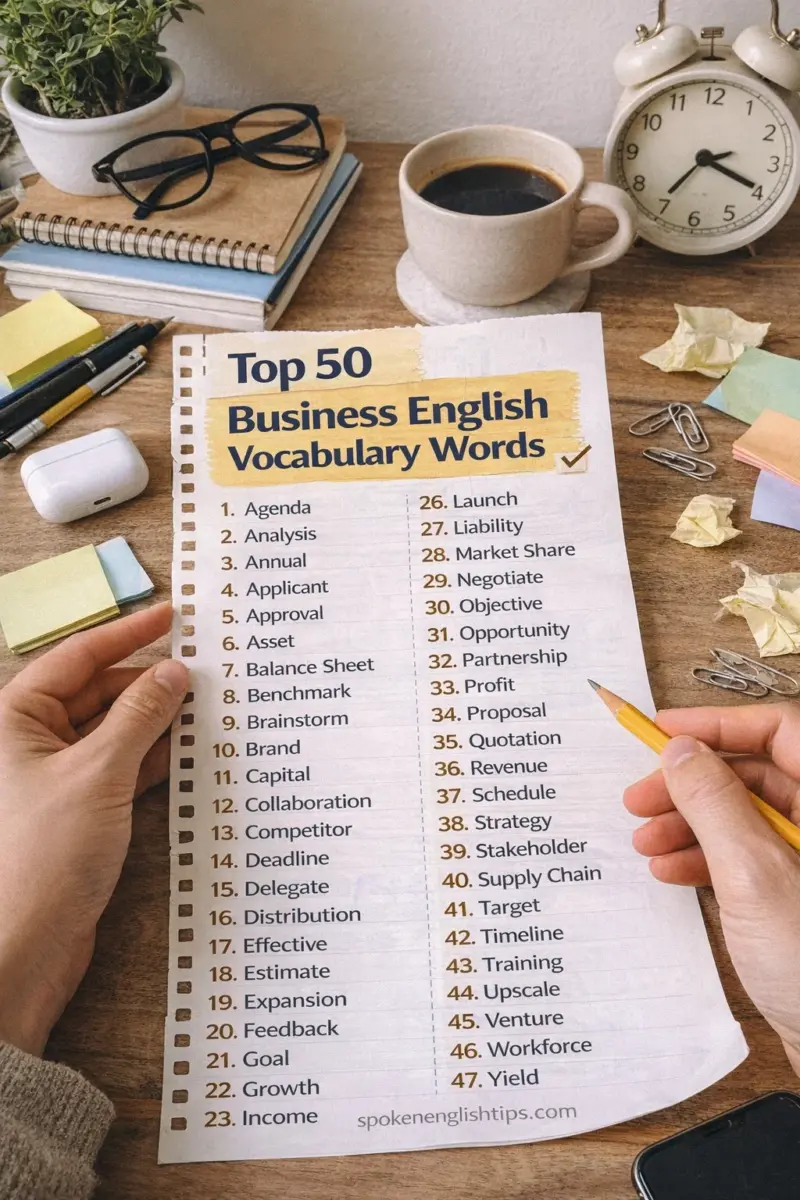We do often celebrate holidays in our lives and there are lots of holidays celebrated in the world. In today’s post, we will study the list of holidays celebrated worldwide with words. We will know all the holiday names in the English language with the use of word meanings in each holiday.
Many holidays are celebrated in the world, mostly in English-speaking countries like Christmas Day, Thanksgiving, Halloween, Mother’s Day, Father’s Day, New Year’s Eve, etc.
We celebrate festivals for various reasons, depending on cultural, religious and historical contexts, etc.
List of Holidays
A holiday is a special day when people don’t have to work or go to school because it’s a tradition or it’s allowed by government rules.
Here is a list of holidays celebrated in the world.
Labor Day – Tribute to the contributions of workers.
New Year’s Eve – Ringing in the new year at midnight.
Thanksgiving – Giving thanks and feasting, often with family.
Christmas – Commemoration of the birth of Jesus Christ.
Father’s Day – Honoring fathers and fatherhood.
Easter – Observance of the resurrection of Jesus Christ.
Halloween – Festivity marked by costumes and trick-or-treating.
International Women’s Day – Recognizing the achievements of women globally.
Mother’s Day – Celebration of mothers and motherhood.
Summer vacation – Break from school or work during summer months.
Valentine’s Day – Day of expressing love and affection.
International Children’s Day – Highlighting the rights and well-being of children.
Wedding – Ceremony uniting two individuals in marriage.
Birthday – Celebration of one’s birth.
April Fools’ Day – A day of pranks and practical jokes.
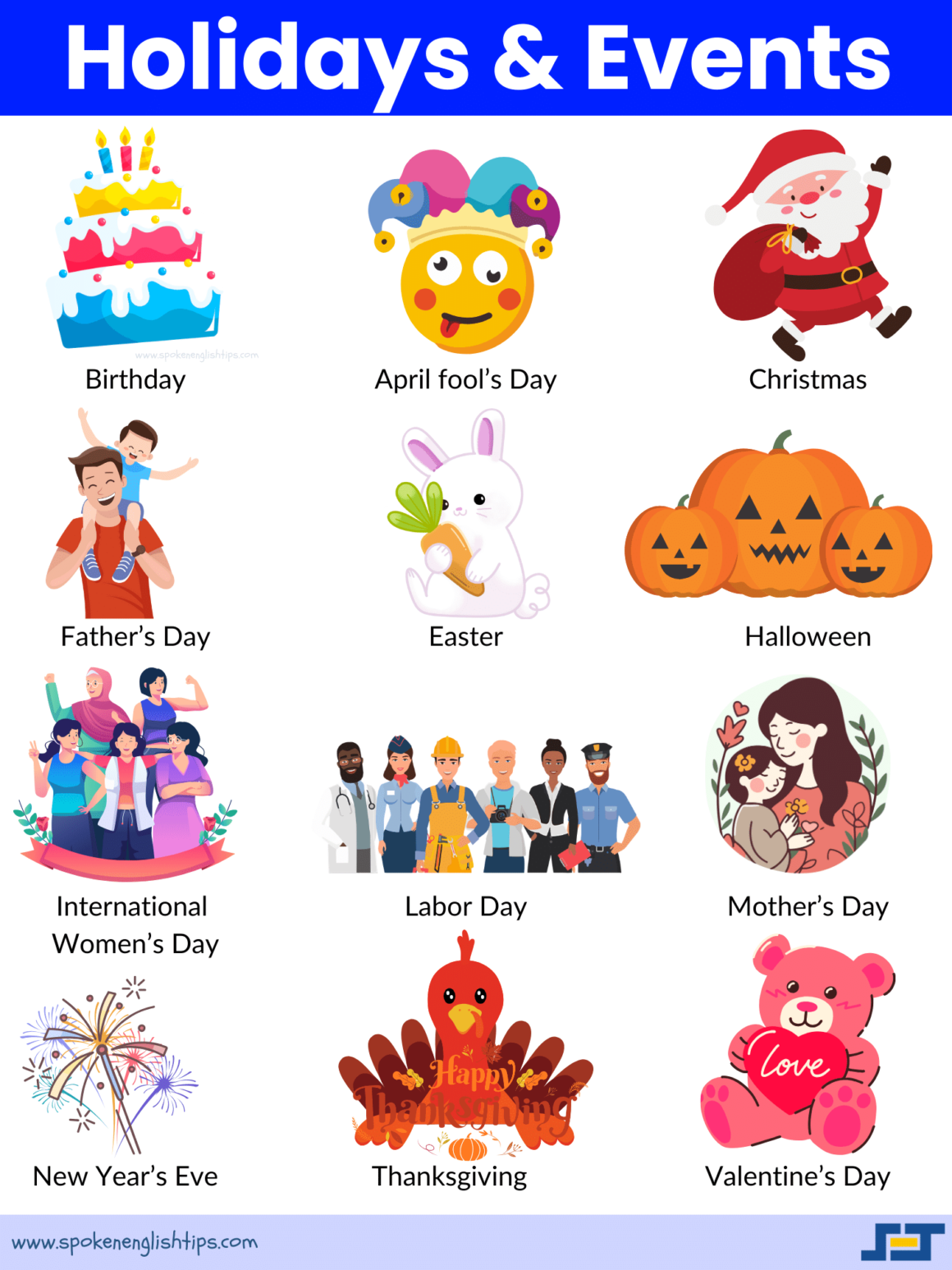
Christmas Vocabulary
- Santa Claus
- Candle
- Reindeer
- Bow
- Christmas tree
- Poinsettia
- Garland
- Decorations
- Santa’s sack
- Light
- Ornaments
- Stockings
- Gifts
- Elf
- Presents
- Sleigh
- Jingle bells
- Nativity
- Manger
- Star
- Angels
- Snowman
- Snowflake
- Wreath
- Candy cane
- Eggnog
- Mistletoe
- Holly
- Carolling
- Christmas lights
- Tinsel
- Fireplace
- Chimney
- Gingerbread
- Nutcracker
- Advent calendar
- Christmas Eve
- Christmas Day
- Yule log
- Family gathering
- Holiday cheer
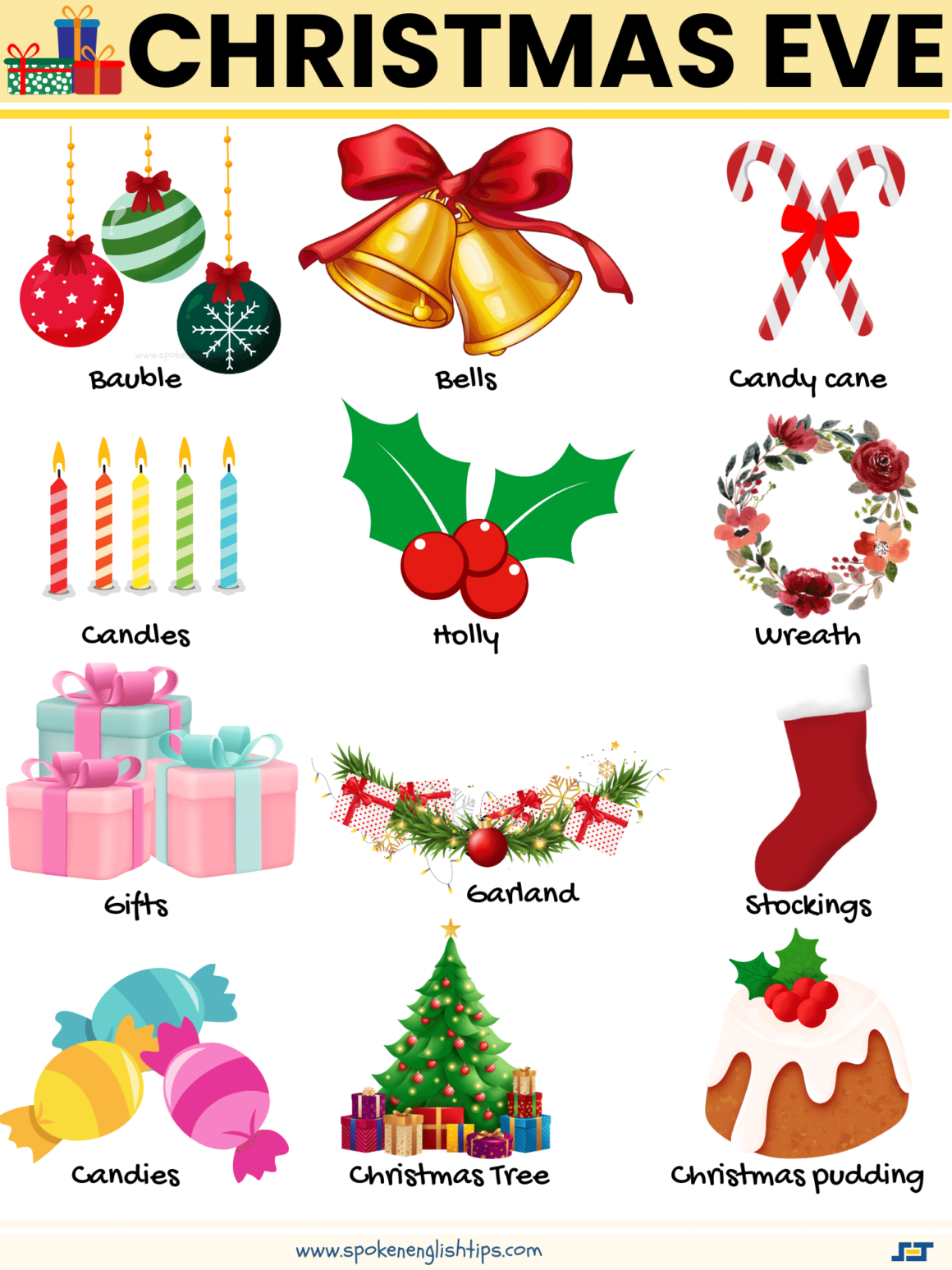
Here you will see a list of holidays and Events with pictures in English and their word meanings.
Birthday Vocabulary
- Birthday
- Celebration
- Party
- Cake
- Presents
- Gifts
- Balloons
- Streamers
- Invitations
- Wishes
- Greetings
- Age
- Milestone
- Candle
- Blow out
- Friends
- Family
- Joy
- Happiness
- Surprises
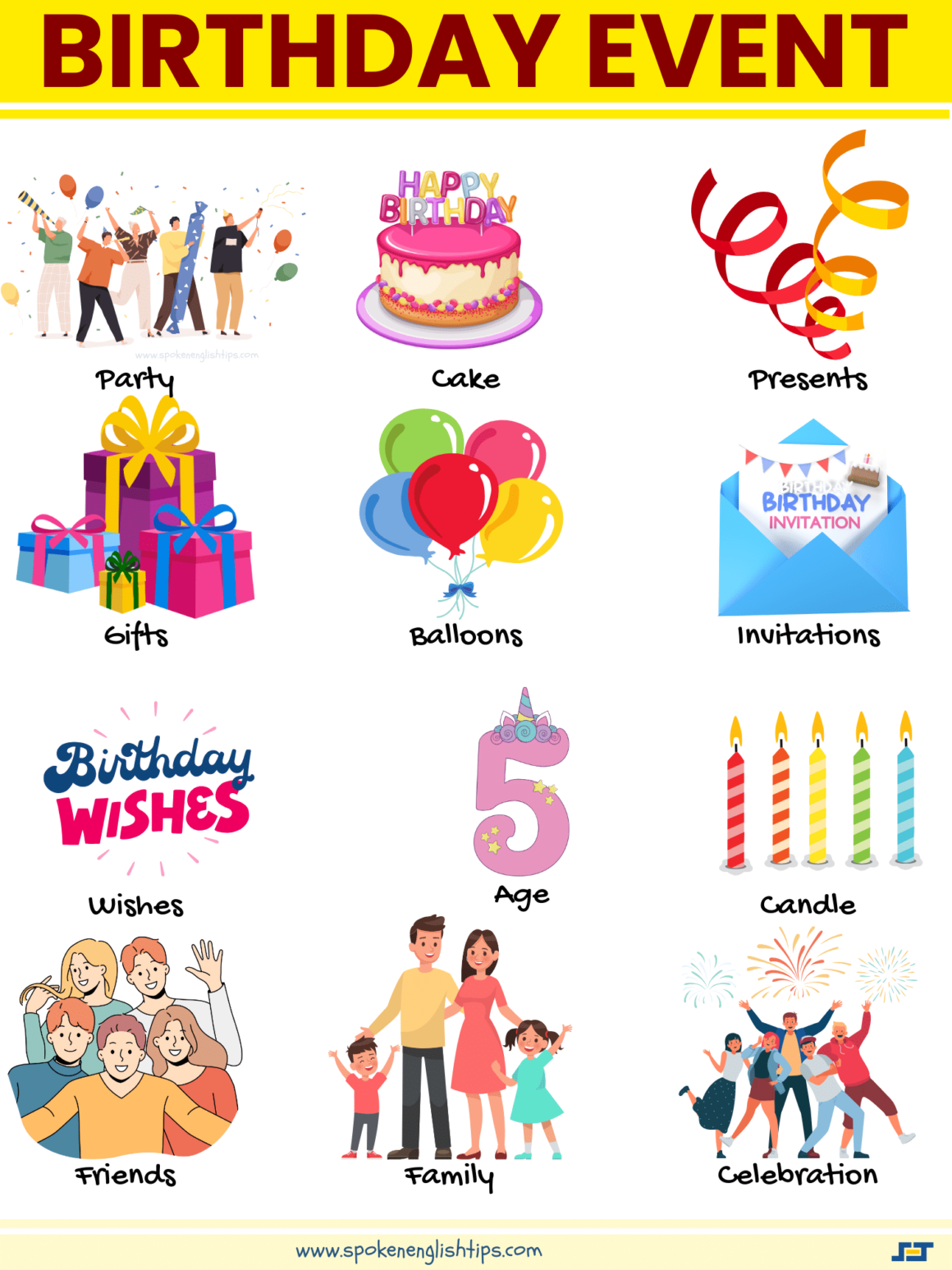
Halloween Vocabulary
Halloween is one of the most famous festivals i.e. celebrated in the United States, Canada, Ireland, the United Kingdom and other parts of the world. It is celebrated on October 31st night.
On Halloween day, people dress up in costumes (often as ghosts, witches, monsters, or other spooky characters), attending Halloween parties, and watching horror films.
- Bat
- Black cat
- Devil
- Mummy
- Haunted house
- Cemetery
- Ghost
- Jack-o’-lantern
- Cauldron
- Candy bag
- Costume
- Witch
- Witch hat
- Candy
- Owl
- Skull
- Tombstone
- Witch’s broom
- Spider web
- Skeleton
- Spider
Valentine’s Day Vocabulary
- Roses
- Chocolates
- Love letters
- Cupid
- Hearts
- Romance
- Candlelight
- Dinner date
- Kisses
- Hugs
- Bouquet
- Teddy bear
- Love songs
- Jewelry
- Perfume
- Poetry
- Candles
- Cuddles
- Proposal
- Sweetheart
Valentine’s Day Vocabulary | Picture
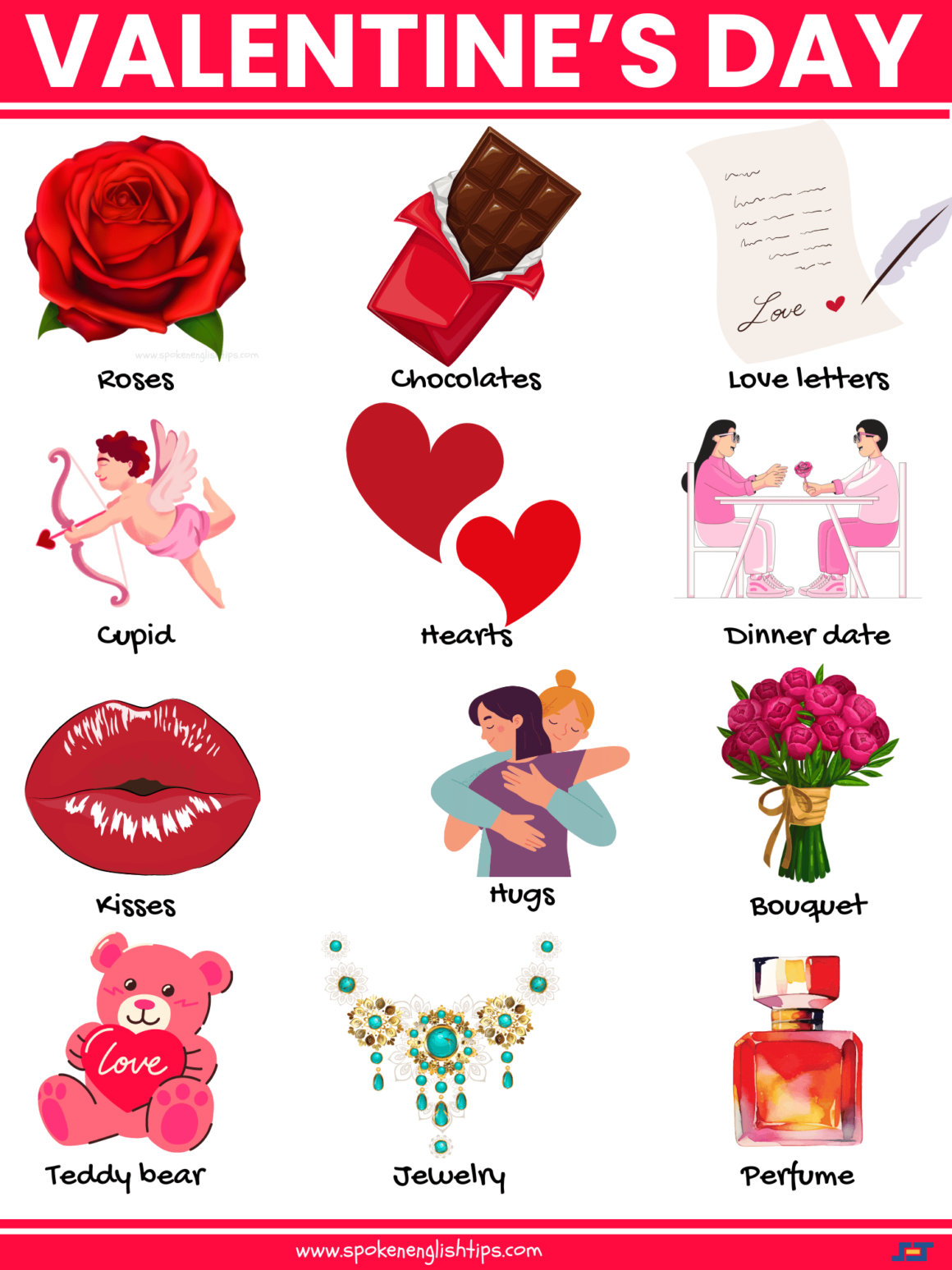
Wedding and Marriage Vocabulary
- Church
- Wedding bell
- Champagne
- Bouquet
- Honeymoon
- Wedding cake
- Engagement ring
- Confetti
- Invitation
- Veil
- Wedding dress
- Bride
- Groom
- Bridesmaid
- Best man
- Priest/ Minister
- Musician
- Flower girl
Indian Marriage Vocabulary:
- Sangeet
- Mehendi
- Baraat
- Mandap
- Mangalsutra
- Haldi
- Pheras
- Saptapadi
- Bindi
- Dulha
- Dulhan Jaimala
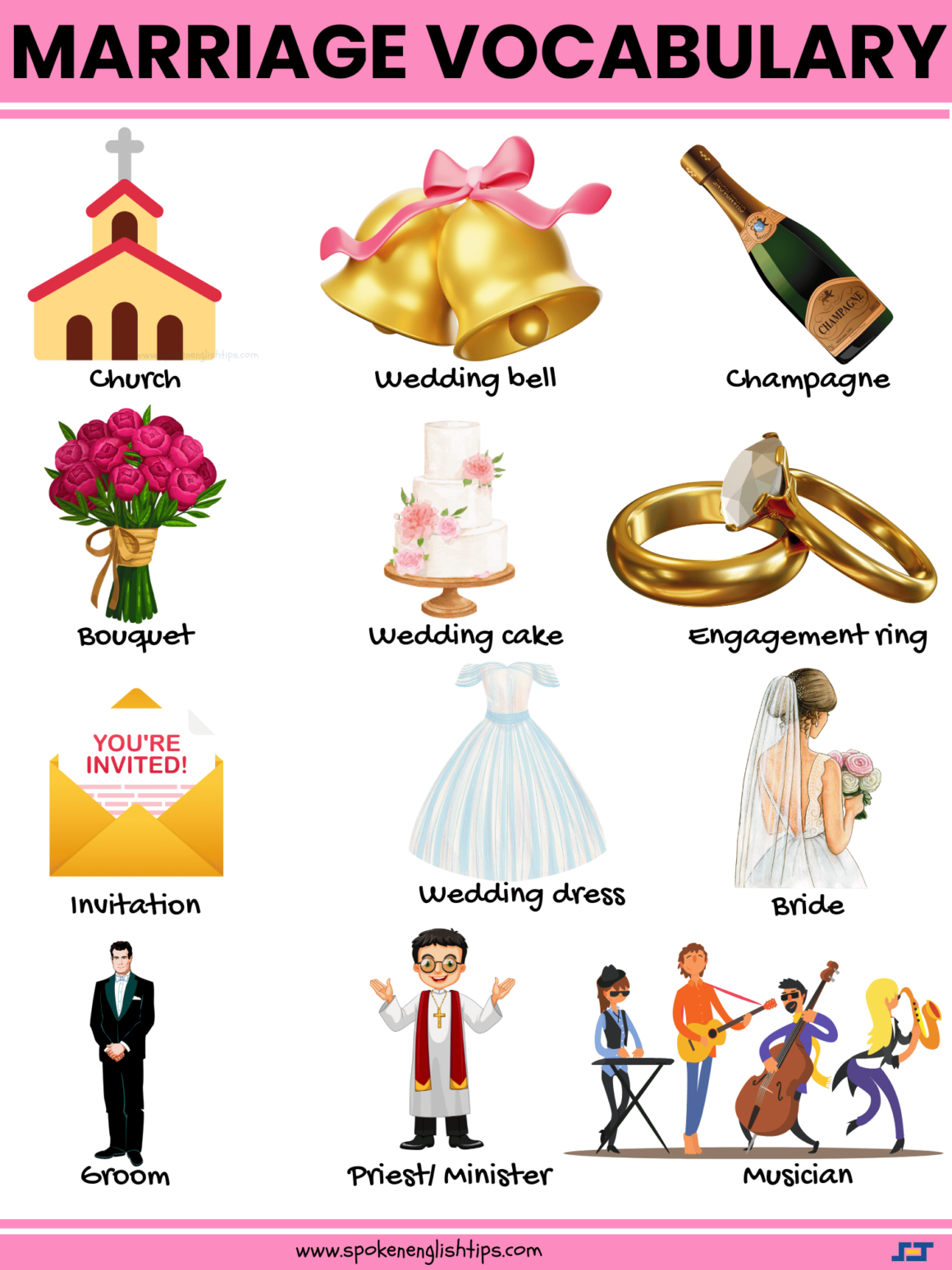
New Year’s Eve Vocabulary
- Celebration
- Countdown
- Fireworks
- Champagne
- Toast
- Resolution
- Party
- Ball drop
- Confetti
- Festivities
- Midnight
- New Year’s kiss
- Sparklers
- Noisemakers
- Cheers
- Gala
- Eve
- New beginnings
- Auld Lang Syne
- Revelling
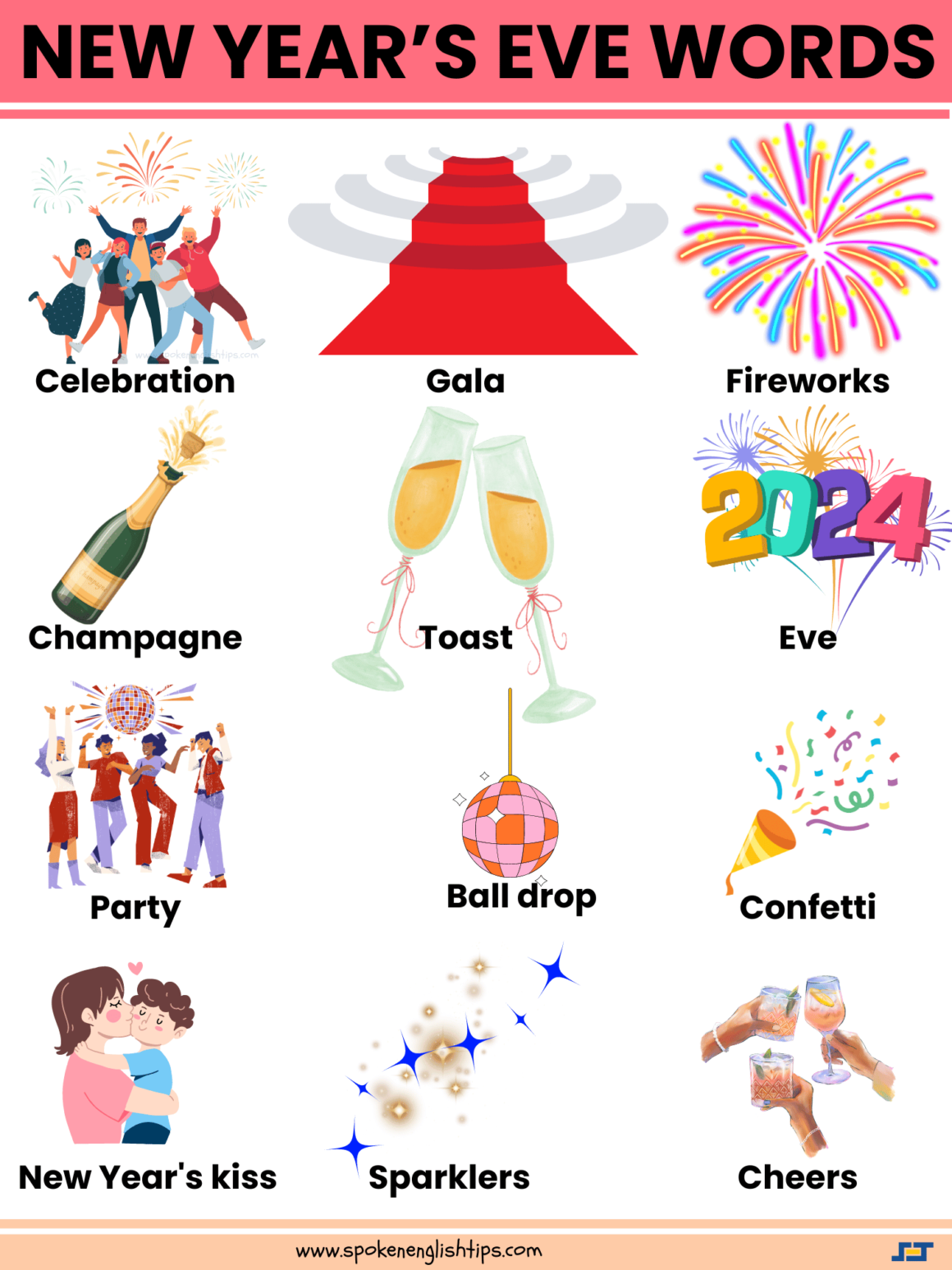
Summer Vocabulary
- Sun
- Beach ball
- Sand toy
- Coconut palm
- Beach
- Deck chair
- Sandcastle
- Beach towel
- Beach vendor
- Bikini
- Swim trunks
- Visitor
- Beach umbrella
- Coconut
- Goggles
- Flip flops
- Hat
- Float
- Sunglasses
- Sun cream
- Pool
- Swimsuit
- Surfboard
- Canoe
- Ice cream
- Popsicle
- Lemonade
- Watermelon
- Barbecue
- Picnic
- Grilling
- Bonfire
- Fireworks
- Frisbee
- Volleyball
- Soccer
- Baseball
- Tennis
- Cricket
- Kite
- Fishing
- Snorkel
- Scuba diving
- Boating
- Jet ski
- Parasailing
- Water skiing
- Wakeboarding
- Sailing
- Windsurfing
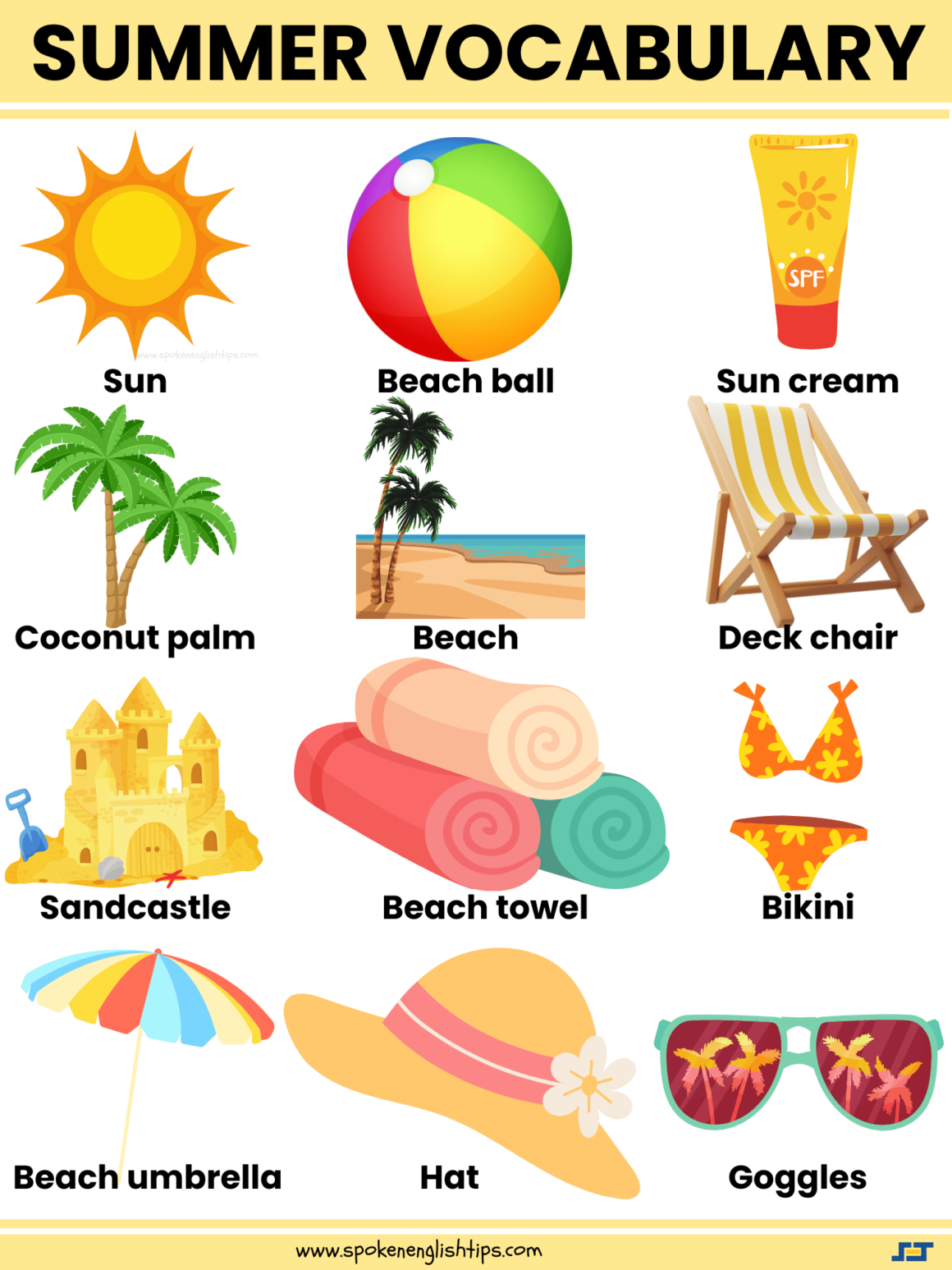
Easter Vocabulary
- Candy
- Easter egg
- Hot-cross bun
- Chocolate
- Chick
- Daffodil
- Tulip
- Crucifixion
- Resurrection
- Cross
- Easter bunny
- Easter basket
- Lamb
- Crown of thorns
- Pattern
Holi Vocabulary
- Holi
- Colours
- Rangoli
- Gulal
- Pichkari
- Thandai
- Gujiya
- Holika Dahan
- Bhang
- Dhol
- Dhuleti
- Phoolon ki Holi
- Lathmar Holi
- Holi Hai!
- Abir
- Holi Milan
- Rangwali Holi
- Holi ke Rang
- Holika
- Bonfire
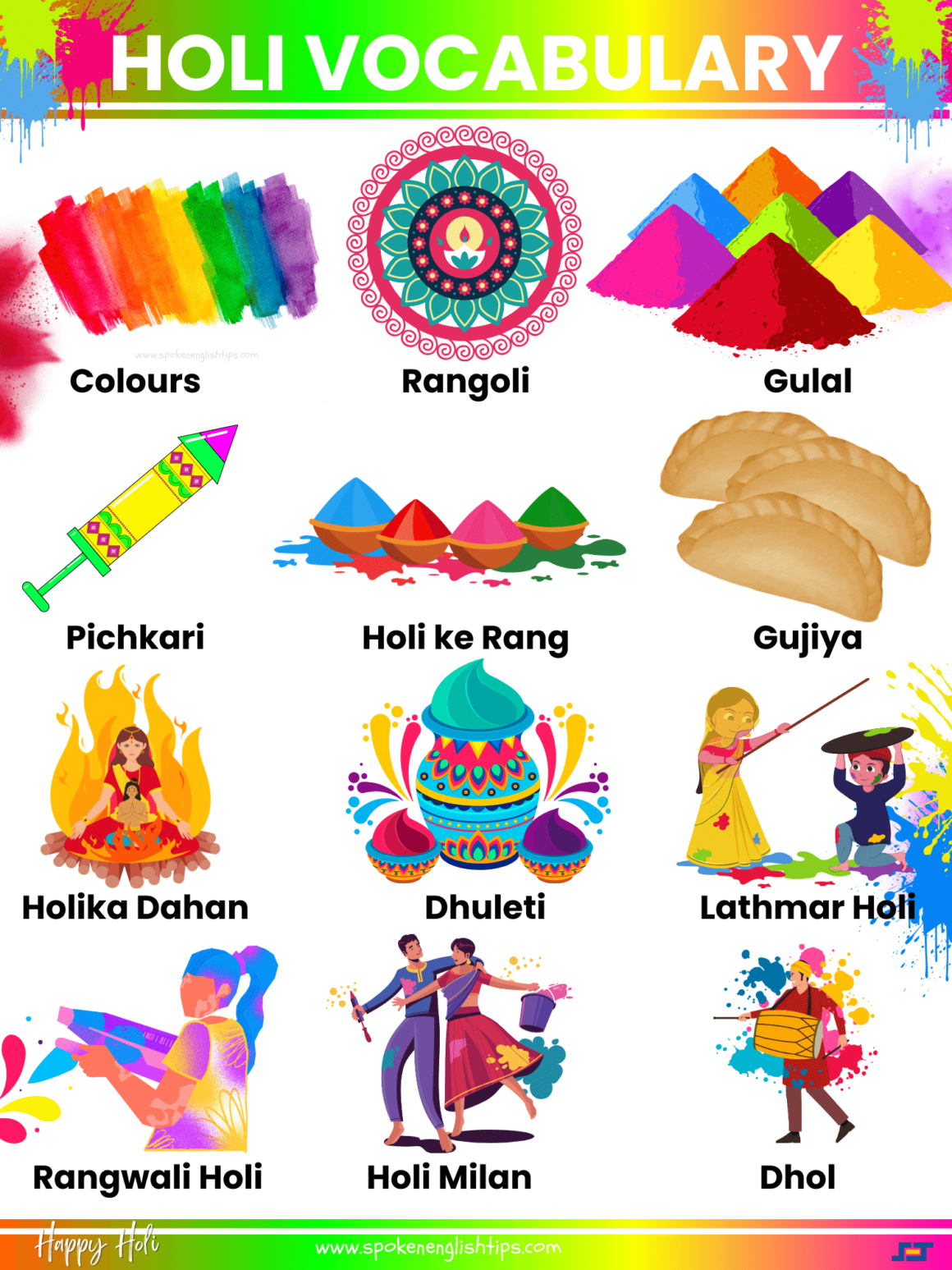
Diwali Vocabulary
- Diwali
- Festival
- Lights
- Lamps
- Candles
- Fireworks
- Rangoli
- Sweets
- Puja
- Diyas
- Crackers
- Prayers
- Family
- Gifts
- Goddess Lakshmi
- Laxmi Puja
- Festive
- Traditions
- Rama
- Sweets
- Celebration
- Happiness
- Joy
- Prosperity
- Auspicious
- Decorations
- Festivities
- Community
- Unity
- Harmony
- Dhanteras
- Victory
- Renewal
- Culture
- Heritage
- Lanterns
- Glitter
- Diwali greetings
- Lanterns
- Traditions
Cultural and Regional Holidays
Cultural and regional holidays vary worldwide, celebrating traditions, history, and community. Examples include Holi and Diwali in India—Thanksgiving in the United States, Carnival in Brazil, and Eid al-Fitr in many Muslim-majority countries. In this article, we have discussed one of the most fascinating festivals in the world which you can read below:
Holi

As we know Holi is the festival of colours celebrated in India and some other countries. It is a Hindu festival. Holi is celebrated for love and Spring. It is also known as the “Festival of Colors”.
The history behind this festival is It signifies the triumph of good over evil, celebrating Vishnu’s victory as Narasimha.
Holi also heralds the arrival of Spring, Also it is celebrated during harvesting season in India. This sacred Hindu tradition fosters unity among people, transcending cultural and religious boundaries.
Diwali

Diwali is the festival of lights which is celebrated all over India. It symbolizes that it is the victory of light over darkness. On this day people decorate their homes with lights, Pooja, Shopping, Fireworks, gifts and sweets and every family comes together and celebrates this festival.
Hanukkah

Hanukkah, also known as the Festival of Lights, is an annual Jewish celebration lasting eight days, typically falling between November and December. It honours the reclamation of the Second Temple in Jerusalem and the miraculous endurance of oil for eight days.
Key elements of the holiday include the Menorah, a nine-branched candelabrum; Latkes, fried potato pancakes; and the Dreidel, a spinning top game.
The Menorah features eight branches representing each day of Hanukkah, with the central branch, called the shamash, used to light the others.
Kwanzaa

Kwanzaa is a cultural holiday observed by African-Americans and Pan-Africans for a week, running from December 26th to January 1st. It highlights values like family, community, and heritage.
Key terms associated with Kwanzaa include the Kinara, a seven-branched candle holder representing the African diaspora and the seven principles of the holiday.
Mkeka refers to a woven mat serving as a base for other Kwanzaa symbols, while Zawadi signifies gifts, often handmade or educational, given to children. Exploring diverse cultural holidays like Kwanzaa enriches our understanding and appreciation of various traditions worldwide.
Chinese New Year

Chinese New Year, also referred to as Lunar New Year or Spring Festival, is a significant occasion marked by family reunions, symbolizing the arrival of a new year and bidding farewell to the old.
Celebrated between January 21st and February 20th based on the lunar calendar, it involves various customs and traditions.
Key elements include the “red envelope,” containing monetary gifts for children or unmarried adults, the vibrant “dragon dance,” symbolizing auspiciousness, and decorative “lanterns,” representing joy and prosperity.
National Holidays in The United States
Here, we have discussed some of the most popular festivals which are celebrated in the United States. Let’s explore some interesting facts, and holiday vocabulary for each of them.
Labor Day

Labor Day, observed on the first Monday of September, commemorates the invaluable contributions of American workers and the labour movement. This holiday, marking the unofficial end of summer is synonymous with gatherings such as picnics. Here are some key terms associated with Labor Day:
- Workforce: The collective body of individuals engaged in or seeking employment.
- Union: A structured association of workers united to safeguard their rights and interests.
- Picnic: An al fresco meal where individuals bring and share food with loved ones, often observed on Labor Day.
Thanksgiving

Thanksgiving, observed on the fourth Thursday of November, originates from early American history when Pilgrims and Native Americans shared a harvest feast in gratitude.
Today, it’s a time for families to unite, share a meal, and express appreciation.
Common Thanksgiving vocabulary includes Turkey (the main dish), Stuffing (a seasoned bread and vegetable side), Cranberry sauce (a sweet cranberry side), and Pumpkin pie (a beloved dessert with pumpkin filling).
Independence Day

Independence Day, also known as the Fourth of July, marks the signing of the Declaration of Independence on July 4, 1776. It’s a day to honour American freedom and patriotism through festivities like fireworks, parades, and patriotic tunes. Key terms associated with this occasion include:
Fireworks: Explosive displays for entertainment, lighting up the sky with vibrant colours and sounds.
Parade: Public processions commemorating special occasions, featuring marching bands, floats, and performers.
Barbecue: The cooking method, typically grilling meat over an open flame, is often a highlight of Fourth of July gatherings.
